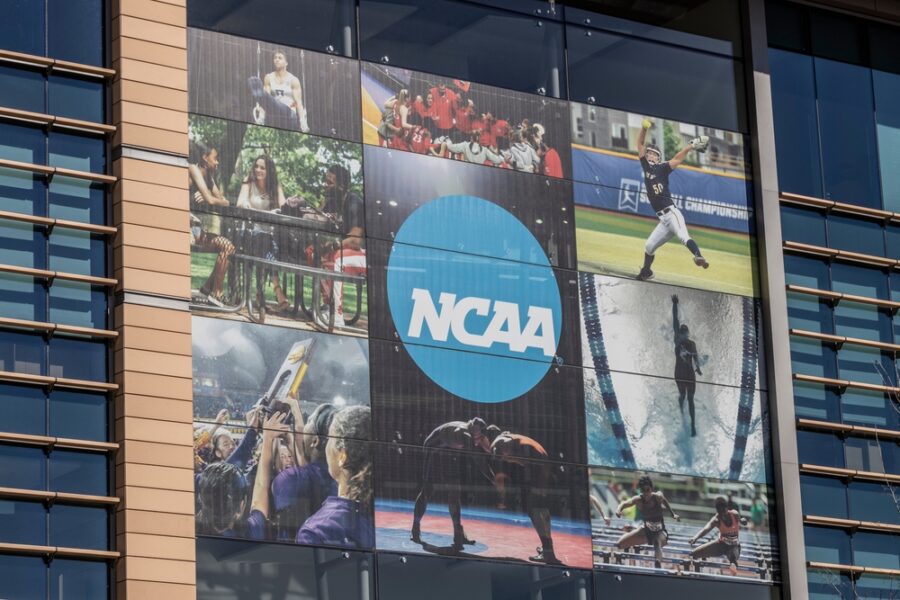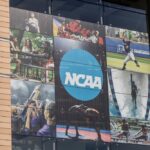NCAA delays rule change on betting by college athletes

The NCAA has postponed a rule change permitting college athletes and athletic staff to bet on professional sports.
The landmark rule change was originally set to come into force on November 1 but has been pushed back to November 22.
On Tuesday, the Division I Board voted to move the date to one day after the membership rescission period ends.
Division I schools have 30 days to overturn a proposal if fewer than 75% of the Division I cabinet approve it. The betting measure had fallen below that threshold earlier this month.
US Securities and Exchange Commission Commissioner Greg Sankey had raised concerns about the change in a note to NCAA President Charlie Baker on Saturday.
Even if the proposal passes, athletes will still be prohibited from betting on college sports or sharing insider information about college competitions.
Roberta Page, Chair of the Division II Management Council and Athletic Director at Slippery Rock, said, “This change recognizes the realities of today’s sports environment without compromising our commitment to protecting the integrity of college competition or the well-being of student-athletes.”
The delay comes amid growing scrutiny of gambling in sports. Last week, an NBA player and coach were arrested in a gambling probe that involved alleged leaks of insider information.
NCAA President Charlie Baker explained, “We run the largest integrity program in the world on sports betting across all the various games. Sadly, we discovered some student-athletes involved with some problematic activity.”
Verticals:
Sectors:
Topics:
Dig Deeper
The Backstory
Why this change now, and why the pause
The NCAA’s latest delay sits atop months of incremental steps toward loosening its long-standing prohibition on student-athletes wagering on professional sports. The Division I Council first signaled a turn in policy when it voted to recommend allowing Division I athletes and staff to bet on pro events, while keeping the ban on wagering related to college sports and prohibitions on sharing insider information intact. That shift, described as an update to rules “written and adopted at a time when sports gambling was largely illegal nationwide,” came through a Division I Council recommendation in April.
The process accelerated in early fall. The Administrative Committee’s endorsement opened the door for Division I, with Divisions II and III set to follow. That sequencing was captured in a subsequent step when the NCAA moved toward allowing betting on pro sports for Division I, foreshadowing a Nov. 1 start if all three divisions aligned. By late October, the momentum broadened. Divisions II and III approved the rule, explicitly noting the change was not an endorsement of gambling and would be paired with campus-level harm-reduction strategies. The cross-division signoff positioned the policy to take effect Nov. 1, as reported in the update that Divisions II and III gave final approval.
The new timeline now reflects the NCAA’s internal rescission procedures and pressure to reexamine implementation. The pause underscores practical realities: legal sports betting is widely available, enforcement has been uneven, and the association is navigating how to align athlete conduct rules with campus peers while protecting competitions. The edges of this compromise — allowing pro betting but not collegiate betting, maintaining insider-information bans and signaling stepped-up education — have been evident in each prior milestone.
What the rule would and would not allow
The prospective policy draws a bright line between professional and collegiate sports. Under the proposal, athletes and athletic staff could wager on pro leagues such as the NFL, NBA, MLB, NHL and WNBA. Betting on college sports would remain prohibited, as would providing inside information on any collegiate competition. These guardrails appeared consistently across the NCAA’s staging posts, including the initial Division I Council stance and the Divisions II and III approvals.
NCAA leaders have emphasized the shift is not a green light for gambling but an adjustment to modern realities. Division leaders have framed the change as rightsizing policy to match the broader student body while maintaining bedrock protections for competition integrity. They also have directed schools to lean on harm-reduction resources developed by the Committee on Competitive Safeguards and Medical Aspects of Sports and the Sport Science Institute, as noted when Divisions II and III endorsed the rule.
Integrity threats driving parallel safeguards
The NCAA’s policy work has unfolded alongside investigations and sanctions that highlight the risks. The association has contended with cases involving student wagering, including a lifetime ban for three former Fresno State men’s basketball players who were found to have bet on their own games, a flashpoint documented when Division I’s move advanced in October. Federal authorities and the NCAA also probed alleged match-fixing tied to smaller conferences, an active concern referenced when the cross-division approvals were announced.
To counter risks, the NCAA has tried to harden its data, monitoring and education infrastructure. A centerpiece is its extended agreement with Genius Sports, which makes the company the exclusive distributor of NCAA data through 2032 and, crucially, bars sportsbooks from offering negative proposition bets on college athletes — wagers that can fuel targeted harassment. NCAA President Charlie Baker said continued access to official data would depend on avoiding those high-risk markets, according to the update on the ban on negative prop bets through Genius Sports extension. The association has pushed states to restrict college prop betting more broadly as part of a layered strategy that also includes abuse tracking and integrity monitoring.
Social media abuse shows the human stakes
College athletes have become flashpoints for online vitriol, often tied to betting outcomes. A report cited by the NCAA found more than 5,000 abusive posts targeting young athletes, with women receiving three times more abusive messages than men and roughly 12% of the abuse related to sports wagering. Those findings informed the NCAA’s push to limit prop bets and strengthen monitoring, as outlined in the Genius Sports update on protecting athletes from negative prop bets.
The NCAA has also tried to quantify progress. During this year’s March Madness, overall betting-related abuse dropped 23% across all athletes, according to an analysis the organization commissioned. Abuse tied specifically to sports betting fell 36% for men and 66% for women, even as total abuse of male athletes rose sharply. The NCAA credited AI-enabled monitoring by Signify Group for helping to identify and address threatening behavior, a result detailed in the March Madness abuse analysis. The data underscores a dual imperative: liberalizing some conduct rules for athletes in an era of legal wagering while curbing fan behavior that can cascade into harassment and threats.
What to watch as the clock resets
The pause resets the timeline and spotlights the NCAA’s internal checks. The policy already cleared key hurdles — a Division I Council recommendation, an Administrative Committee approval and Divisions II and III signoff — but it still must survive the final procedural window. If it takes effect, athletic departments will need to update compliance education quickly, focusing on the college-pro divide, insider-information risks and the continuing ban on collegiate betting. Expect expanded training on social media safety and gambling harm reduction alongside reinforced reporting lines for suspicious approaches or activity.
For the broader ecosystem, sportsbooks and data firms will be watching NCAA integrity expectations, especially around props, data access and cooperative monitoring. State regulators will weigh how NCAA safeguards fit with existing statutes on collegiate markets. And for athletes, the immediate impact would be narrow — permission to place bets on professional sports under school and state rules — while the longer-term test will be whether the measures around them can keep competition clean and harassment in check.






